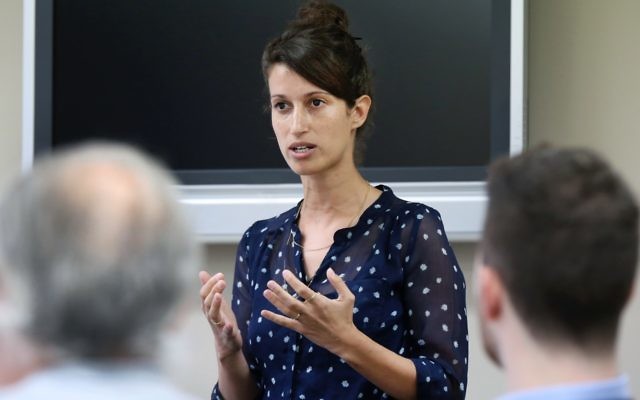Taking Israeli aid to the world
MISSION leader for IsraAID Hagit Krakov told an audience in Sydney on Tuesday that the Israel-based humanitarian organisation has faced a backlash from other non-government organisations (NGOs) during the course of its global emergency response and disaster relief work.
MISSION leader for IsraAID Hagit Krakov told an audience in Sydney on Tuesday that the Israel-based humanitarian organisation has faced a backlash from other non-government organisations (NGOs) during the course of its global emergency response and disaster relief work.
Krakov, who has most recently led IsraAID teams tackling the refugee criss in Greece and supporting local communities in the aftermath of February’s cyclone in Fiji, was speaking at an event hosted by the United Israel Appeal of NSW, the Embassy of Israel and the Executive Council of Australian Jewry.
She explained that some NGOs criticise and actively try to undermine IsraAID’s efforts as an organisation coming from Israel.
“We have experienced difficulties in Europe … It was more from other organisations that came to say that we’re hypocrites,” she told the audience.
“We had some refugees telling us that other organisations told them not to approach us.”
Krakov added that, nevertheless, in her experience neither IsraAID nor the refugees are deterred by this.
IsraAID – whose teams are made up of Israelis from Jewish, Arab, Bedouin and Muslim backgrounds – continues to provide support to communities and people in the midst of immense hardship, wherever and whoever this may be.
“If they need support and we can give it, we go to places where we can enter and where we can’t enter as well,” she explained.
Krakov said that many IsraAID workers, herself included, use their second non-Israeli passports to enter countries where using an Israeli passport could prove problematic, such as Iraq.
The IsraAID mission leader also spoke of the “reversal of roles” in Europe where refugees are fleeing political instability and war in the Middle East and are being helped by Israel, a nation that is much maligned by the countries these refugees are fleeing.
“[These are] people who are running away from those who are supposed to represent them and are running into the arms of those who are supposed to be their enemies.”
Krakov also described what it is like to be a humanitarian worker on the ground in disaster and emergency situations.
“In these situations, you either freeze and it’s just too big and too scary, or you get into this action mode and you start operating,” she said.
“You feel everything, you observe everything, but you are in action mode.
“And then at night you cry a bit and you wipe your tears and you go out again because that’s what you do.”
ELENORE LEVI
For more information, visit www.israaid.co.il.


comments